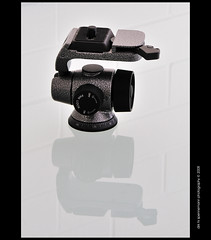Difference between revisions of "Gitzo"
m (→Cable Releases) |
m (→Self-Timers) |
||
| Line 254: | Line 254: | ||
===Self-Timers=== | ===Self-Timers=== | ||
| − | "Auto-retardateurs" were based on a (patented) pneumatic principle and resembled in their shape metal syringes. It allowed for a shutter delay of up to 30 seconds. | + | "Auto-retardateurs" were based on a (patented) pneumatic principle and resembled in their shape metal syringes. It allowed for a shutter delay of up to 30 seconds. The production of self timers ceased in the 1980s. Two main tpes of auto retardateurs were produced, the standard model and the 'junior', which lacked the option to control the amount of time elapsed (only allowed for 30secs). The standard model was produced in a number of variants to alow for use with standard (pin) releases, Leica releases and Polaroid releases. |
| − | |||
===Flash Synchronisators=== | ===Flash Synchronisators=== | ||
Revision as of 00:50, 14 October 2008
| French | () | |
|---|---|---|
| companies | ||
| AFR | Alsaphot | André and Lieutier | Angénieux | Arca Swiss | As de Trèfle | Atoms | Aubertin | Balcar | Bardin | Bauchet | Baudry | Bellieni | Berthiot | Boumsell | Boyer | Bronzavia | Cindo | Cord | Cornu | Coronet | Darlot | Demaria-Lapierre | Derogy | Faller | FAP | Fex | Français | Compagnie Française de Photographie | Gallus | Gaumont | Georges Paris | Girard | Gitzo | Goldstein | Héard & Mallinjod | Hermagis | Idam | Itier | Jousset | Joux | Kafta | Kinax | Kodak Pathé | Krauss | Lumière | Lund | Mackenstein | Manufrance | MAPED | Mazo | MFAP | MIOM | Mollier | Mundus | Olbia | Omega | OPL | Pierrat | Richard | Richard (Jules) | Roussel | Royer | SEM | Secam | SIAP | Soulé | Spirotechnique | Tiranty | Vergne | Zion (France) | ||
Gitzo is a French company, founded in 1917. Its name was derived from the founder's name Arsène Gitzhoven.[1] 'Gitzo' was a name given to an early shutter (see below) and later adopted for all products manufactured by the company. Initially Gitzo made camera equipment and precision accessories, especially shutters. After World War II it concentrated on the manufacture of tripods and tripod heads, for which it is renowned today.

|
| Gitzo Logo (Current) (Image rights) (Image rights) |
Contents
History
In the beginning, the company manufactured wooden as well as metal film backs adapted to the majority of the cameras manufactured in Europe. In the early or middle of the 1920s the company started to produce its own cameras, the Gilax series of 6.5 X 9, 6.5 X 11 and even 24 X 36 cm. In the 1930s Gitzo gave up the manufacture of cameras to concentrate its know-how on a range precision accessories. Gitzhoven registered a range of patents for shutters both France and the United States of America [2]. In addition to shutters the company produced as range of precision accessories such as delayed action mechanisms, flash connectors and cable releases. Gitzo shutters, rproduced at a rate of 750 a day, were used by a wide range of camera manufacturers (see list below). The firm ceased operations from 1942 to 1945. After World War II it continued to produce shutters and precision accessories, but also branched into the production of tripods from 1950. In 1953 Gitzo patented the first rapid column tripod, followed by the world's first carbon fibre tripod in 1994 and the World's first magnesium tripod head in 1996.
In 1960, Arsène Gitzhoven retired and his daughter, Yvonne Plieger, took over the company. When Gitzo became part of the Vitec Group in 1992, the manufacture of accessories ceased and the company concentrated on tripods and tripod heads. Between 2001 and 2005 the company was gradually transferred from France to Italy. Currently (2008) Gitzo manufactures tripods, tripod heads and photographers' clothing.[3]
Company Logo
The initial logo used by Arsène Gitzhoven were his initials, displayed as a capital 'A' set inside a capital 'G' (called 'AG marking' in the list below). The name 'GITZO' derived from one of the shutter types and became eponymous for all products produced by Gitzhoven. During the Art Déco era both the G and the O of 'GITZO' were stylised, with the 'O' shaped like a Greek ∆. Since the 2002 reorganisation, the company logo is a dark blue square with the word 'GITZO' in the centre.
Breveté
Numerous descriptions of GITZO products in on-line auctions refer to the brand or product line "GITZO BREVETE" or "GITZO BREVETE SGDG." This is based on a misinterpretation. 'Breveté' simply means 'patent,' and "S.G.D.G." is an abbreviation for "Sans garantie du Gouvernement" which means that a patent had been applied for but not yet granted (akin to the 'Patent pending' in UK and USA parlance).
Cameras
Gilax series of 6.5 X 9, 6.5 X 11 and 24 X 36 cm; produced in the 1920s.
Shutters
Between the 1920s and the 1960s Gitzo was a renowned supplier of shutters for various French and foreign camera manufacturers. Arséne Gitzhoven held a wide range of patents on shutters and shutter improvements. The production of shutters ceased in 1992. The list below is a compilation of known shutter applications. It is certain that this list is incomplete and thus needs to be regarded as a work in progress.
"PLAVICOS"
black and white disc (settings: 25-50-100-B-T)
reputedly made by Gitzhoven[4]
Used in the following cameras:
"STELLA"
black and white disc (settings: 25-50-100-B-T, AG marking)
Used in the following cameras:
- Clément
- Ercé, (120)
- L. Clément Claror 105/6.3
- Ercé, (120)
"GITZO"
VARIANT 1: black disc (max: 1/100th)
(settings: 25-50-100-B-T, AG marking)
Used in the following cameras:
- Caillon
- Stereo plate camera, (c. 1920)
- Krauss Paris Tessar Zeiss 85/4.5
- Stereo plate camera, (c. 1920)
- R. Delarue
- Erdé
- Radior 105/6.3
- Erdé
- Manufrance
- Luminor (c. 1930)
- Luminor 105/6.3 (120)[10]
- Luminor (c. 1930)
- unknown manufacturer (plate camera)
VARIANT 2: red centre with black ring (max: 1/100th)
(settings: 25-50-100-B-T, AG marking)
Used in the following cameras:
- ??
- Roussel Trylor 100/4.5
- ??
- Balda
- Héard & Mallinjod
- Merkel
- 9 x 12
- Roussel Trylor 100/4.5
- 9 x 12
- unknown manufacturer (120)
GITZ∆
[with art deco face plate]
(settings: T-B-25-50-100, AG marking)
Used in the following cameras:
- Caleb (120)
- Berthiot 120/6.3
- unknown manufacturer (120)
- Armor 105/6.3
Type 1
(settings: T-B-25-50-100-125, AG marking)
Used in the following cameras:
- Rex 6x9
- Boyer Topaz 100/4.5
- Rex 6x9
Type 2R
(settings: T-B-25-50-100-150, AG marking)
Used in the following cameras:
- Boumsell
- Olbia
- Type?
- Roussel 75mm
- Type?
- Pontiac
- Bloc Métal 41 (?1941–1948)
ZOTIC I
(settings: 200-150-100-50-25-B)
Used in the following cameras:
- Pontiac
- Bloc Métal 45 ('Standard')(c. 1949–1954)
GITZ∆-PARIS
VARIANT 1: 200-25
Settings: 200-150-100-50-25-B
Used in the following cameras:
- Demaria-Lapierre
- Telka XX c. 1950
- Manar 110/4.5
- Telka XX c. 1950
- Olbia
- Omega Eikon (Pseudo TLR 6x6) (1947)
- Vergne
VARIANT 2: 250-25
Settings: 250-200-150-100-50-25-B
Used in the following cameras:
- Olbia
- Omega Eikon (Pseudo TLR 6x6) (1947)
- ???[17]
- Omega Eikon (Pseudo TLR 6x6) (1947)
VARIANT 3: 300-25
Settings: 300-200-150-100-50-25-B
Used in the following cameras:
- Olbia
- Omega Eikon (Pseudo TLR 6x6) (1947)
VARIANT 4: 400-25
Settings: 400-250-200-150-100-50-25-B
Used in the following cameras:
AZUR - PARIS - FRANCE
Shutter settings: T-B-25-50-100-150.—Used in the following cameras:
- Boumsell
- Azur (1948)
- Roussel Triolor 105/4.5
- Azur (1948)
NORCA-PARIS
(settings: T-B-25-50-100-300)
Used in the following cameras:
- Fap
- Norca A 24 x 36 (1938)
- Berthiot Flor 50/3.5
- Norca A 24 x 36 (1938)
Other Products
GITZO produces a wide range of small products for the photographic market, ranging from cable releases to self timers and flash synchronisators.
Cable Releases
A number of cable releases were produced ranging from 50mm to an astounding 1500mm!. In addition, GITZO produced pneumatic cable releases. The production of cable releases ceased in 1992.
to be expanded
Self-Timers
"Auto-retardateurs" were based on a (patented) pneumatic principle and resembled in their shape metal syringes. It allowed for a shutter delay of up to 30 seconds. The production of self timers ceased in the 1980s. Two main tpes of auto retardateurs were produced, the standard model and the 'junior', which lacked the option to control the amount of time elapsed (only allowed for 30secs). The standard model was produced in a number of variants to alow for use with standard (pin) releases, Leica releases and Polaroid releases.
Flash Synchronisators
to be expanded
Tripod Types
Gitzo produced a wide range of tripods. From the 1960s onwards the pattern of tripods was uniform, based on a structure of "series' with increasing tube diameter:
- 00 Table 5/8")
- 0 Weekend 3/4")
- 1 Sport (7/8")
- 2 Reporter/Mountaineer (1-1/8")
- 3 Studex & Inter Pro Studex (1-1/4")
- 4 Pro Studex (1-1/2")
- 5 Tele Studex (1-5/8")
From 1970 onwards the tripods were painted in the distinctive “Noir Decor” hammered finish.
Tripod Heads
The company produced a wide range of tripod heads for still and video cameras. The most innvoative was the off centre ball head, which came in a range of sizes corresponding with the tripod.

|
| Gitzo off centre ball head (current model GH2750QR) (Image rights) (Image rights) |
Notes and References
- ↑ History page of the GITZO official website [1]
- ↑ Shutter for photographic apparatus - United States Patent 1953556 [2]
- ↑ GITZO official website [3]
- ↑ Silvain Halgand [4]
- ↑ reputedly the entire camera made by Gitzhoven; Silvain Halgand [5]
- ↑ advertisement reproduced by: Silvain Halgand [6]
- ↑ Sylvain Halgand 'Hemax Folding 6 x 9' [7]
- ↑ Sylvain Halgand 'Hemax 9 x 12' [8]
- ↑ Sylvain Halgand 'Siva' [9]
- ↑ The camera uses a Plavic] Folding base....Sylvain Halgand 'Manufrance Luminor' [10]
- ↑ e-bay 190256383649 (October 2008)
- ↑ ebay 200262247302 (October 2008)
- ↑ Sylvain Halgand 'Hemax 9 x 12' [11]
- ↑ ebay 370092317596 October 2008
- ↑ ebay 110298522677 Oct 2008
- ↑ Olbia 6x6 [12]
- ↑ Olbia 6x6 [13]
- ↑ e-bay nº 230232028350 (September 2008)
- ↑ Olbia 6x6 [14]
- ↑ Olbia 6x6 [15]